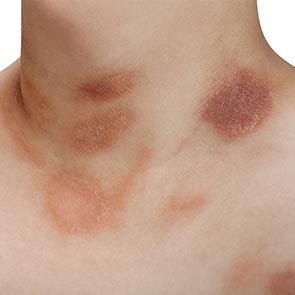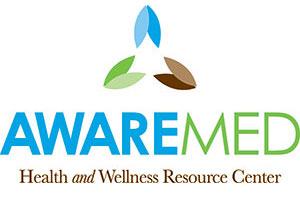Pityriasis Rosea Treatment Johnson City, TN

If you've been struggling with an itchy pink or reddish rash and fever, headache, or joint pain you may have pityriasis rosea, a common viral skin condition that causes flulike symptoms.
While this condition looks dramatic, it's typically quite mild and isn't a major health concern unless you're pregnant—in that case, it can sometimes cause miscarriage or other pregnancy complications. Getting medical attention is a good idea so your medical provider can help you treat the rash and diagnose or rule out other medical problems.
To speak with a pityriasis rosea specialist today in Johnson City, call (423) 482-8711 or contact Dr. Dalal Akoury online.
What are the symptoms of pityriasis rosea?
Flulike symptoms often occur 1-3 days before the rash appears. These include fever, headache, and joint pain, or rarely, nausea, sore throat, and fatigue. Most patients with this condition don't experience these symptoms and generally feel healthy. Pityriasis rosea is not contagious.
The rash first appears as a single oval pink patch with a dark border, commonly known as the "mother" or "herald" patch. It typically appears on your stomach, chest, back, or neck. This small patch appears between 2 days and 2 weeks before the main rash evolves over a much larger area.
The main rash is a mass of small patches that can cover almost any part of your body. However, this condition usually doesn't affect the face. People with light skin typically develop pinkish-red patches, while darker-skinned people develop gray, brown, or black patches.
Itching is the most common symptom. While it usually isn't severe, it can be annoying. Still, up to 50% of people with pityriasis don't experience itching.
Sometimes pityriasis rosea can cause health these complications:
- pregnancy complications: miscarriage, premature birth and post-pregnancy problems
- unusual bumps, blisters, or bruising
- large patches that merge with others, or unusual distribution of lesions on armpits, groin, or in your mouth
- single mother patch not followed by a wider rash
- severe itching
- a longer period of infected time than expected
- condition recurrence
If you're pregnant, or if you experience any of these strange symptoms, don't wait—speak with your medical provider immediately to avoid further health problems.
What causes pityriasis rosea?
Medical science isn't certain what causes this condition. It's known that it's caused by a virus and never occurs due to allergies, bacteria, or fungal infection. Some evidence suggests it may be caused by certain strains of herpes virus. Getting this condition twice in your life is extremely rare, though it does occur.
A viral infection like herpes 6 or 7 may cause the rash, but medical providers are uncertain why it cannot be transferred from person to person like other viruses. In rare cases, pityriasis can occur as a side effect of some medications.
Research into this condition is ongoing.
How is pityriasis rosea diagnosed?
Your medical provider or dermatologist can diagnose or rule out pityriasis or many other conditions that cause rashes.
Typically, you'll be physically examined, and in some cases, your medical provider may take a small skin sample to rule out fungal infections like ringworm. A blood test can help rule out secondary syphilis, a rare condition that can mimic the symptoms of pityriasis rosea. Other conditions that may cause a similar rash include eczema, psoriasis, tinea versicolor, and nummular dermatitis.
How is pityriasis rosea treated?
This condition typically resolves itself within 12 weeks without medical treatment. More severe cases can be helped with treatment, including:
- moisturizing creams to reduce itching and dryness caused by everyday soaps
- steroid cream or ointment: hydrocortisone products like Betamethasone can reduce redness, itching, and swelling, but may cause skin redness or stinging, rash, inflamed hair follicles, cataracts, hives, skin ulcers, and several other side effects
- antihistamines: taken orally, can help you sleep if your itching is severe; may cause eye, mouth, and sinus dryness, and blurry vision, dizziness, restlessness, or nausea
- calamine lotion: can safely reduce itching
- bathing or showering in cool or lukewarm water
Home remedies include:
- coconut oil: anti-microbial
- aloe vera: anti-microbial hydrator
- colloidal oatmeal: has anti-inflammatory properties
- lavender oil: contracts would via acceleration of granulation
- catechu paste: antibacterial properties
- tea tree oil: reduces inflammation; relieves itch
- garlic: anti-microbial properties released by chewing cloves; may reduce infection
- flaxseed: omega-3 fatty acids may reduce skin itching and redness
- calendula flower: may reduce redness and promote skin healing
- plantain leaves: may have anti-inflammatory properties when applied topically
- mullein: antiviral properties can reduce itching when applied topically
- chickweed salve: may relieve itching and soften skin
- comfrey leaf and root: may increase skin healing speed
Reserve Your Appointment Now
Pityriasis rosea usually isn't dangerous and typically doesn't cause any long-term effects, but it can cause annoying itching and an undesirable skin appearance. If you're pregnant, seeking medical attention is very important because pityriasis can negatively affect your health or your child's health.
A specialist can help reduce or eliminate your symptoms and protect your health if you're pregnant. To speak with a pityriasis rosea specialist in Johnson City today, call (423) 482-8711 or contact Dr. Dalal Akoury online.
AWAREmed Health and Wellness Resource Center
Address
1604 Lamons LaneSuite 202
Johnson City, TN 37604
(423) 482-8711
www.awaremed.com
Hours
Mon:
9:00 am - 5:00 pm
Tue:
9:00 am - 5:00 pm
Wed:
9:00 am - 5:00 pm
Thu:
9:00 am - 5:00 pm
Fri:
9:00 am - 5:00 pm


